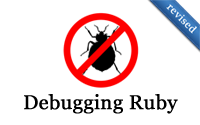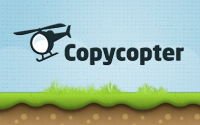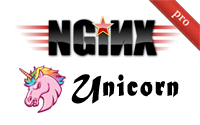Categories
- Active Record
- Active Resource
- Active Support
- Administration
- Ajax
- APIs
- Authentication
- Authorization
- Background Jobs
- Caching
- Code Walkthrough
- Controllers
- Debugging
- Deployment
- eCommerce
- Forms
- Mailing
- Models
- Performance
- Plugins
- Production
- Rack
- Rails 2.0
- Rails 2.1
- Rails 2.2
- Rails 2.3
- Rails 3.0
- Rails 3.1
- Rails 3.2
- Rails 4.0
- Refactoring
- Routing
- Search
- Security
- Testing
- Tools
- Views
Debugging Ruby (revised)
This episode will show you how to debug a rails app using the "debugger" gem: set a breakpoint, inspect variables and change the executed code at runtime.
(7 minutes)
Copycopter
Copycopter provides a nice interface that clients can use to edit the text in a Rails application. Learn how to deploy a Copycopter server using Heroku and integrate it in a Rails application through I18n.
(6 minutes)
Bundler (revised)
Bundler makes it easy to manage Ruby Gem dependencies. Learn how to use it in a Rails application, see what's new in Bundler 1.1, convenient ways to run bundle exec, and how to fix gem compilation issues.
(9 minutes)
Asset Pipeline in Production
The Asset Pipeline is very useful, but it can be a pain in production. Here I show why it works the way it does, and how to customize it to fit your deployment setup.
(13 minutes)
Receiving Email with Mailman
The Mailman gem makes it easy to receive email in a Rails application. Here I show how to write a script to run Mailman in its own process and pull down mail from a POP3 account.
(11 minutes)
Oh My ZSH
As Rails developers, we frequently use the command line. Here I will show how to switch to Z Shell using Oh My ZSH including how to make your own theme and plugins.
(9 minutes)
Sending HTML Email
HTML email can be difficult to code because any CSS should be made inline. Here I present a few tools for doing this including the premailer-rails3 and roadie gems.
(5 minutes)
Cron in Ruby (revised)
Cron is a common solution for recurring jobs, but it has a confusing syntax. In this episode I show you how to use Whenever to create cron jobs using Ruby. Some alternative scheduling solutions are also mentioned.
(6 minutes)
Virtual Machines with Vagrant
Vagrant allows you to run your Rails application and all of its dependencies in a portable, sharable environment. Use for development, set it up as a staging server, or experiment with a production setup.
(11 minutes)
Nginx & Unicorn
Nginx and Unicorn make a killer-combo for hosting a Rails application in production. Learn how to configure each in a Vagrant virtual machine in this episode.
(19 minutes)










